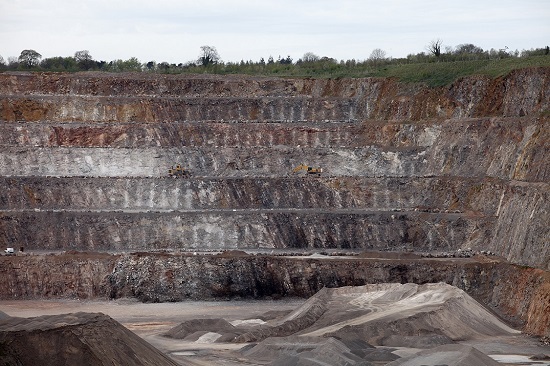
In a wide-ranging and thought-provoking column in the Winter 22/23 issue of mineral products today, the MPA’s official magazine, Prichard said: “Joining a new industry sector – even one to which I have been relatively close to as a civil engineer – was always going to be a steep learning curve.
“But it’s also the only time you can offer a ‘fresh pair of eyes’ on established practices and perceptions, an opportunity to reflect on what I’ve seen and heard – from the MPA team, from MPA members I’ve visited so far and from some of the external stakeholders on whom our licence to operate depends. These issues may be well-trodden ground for those inside the industry, but for many outside, they’re still not within their field of view.
“The first thing that struck me is the persistent lack of awareness and appreciation, not of mineral products themselves, but of the strategic nature of the mineral resources we have on our isles. The assumption that minerals can and will continue to be supplied indefinitely seems astonishing, with only passing consideration given to the complexity of this issue by policymakers, commercial developers and contractors."
Prichard said that reflecting on this, it’s clear there’s little capacity – or even desire – among some of the industry’s stakeholders to truly understand the whole supply chain system. “Government departments and commercial enterprises are tactically focused on their relatively small link in the chain. Their priority is solving the issues that are immediate and local to them and for which they are directly responsible,” he noted.
He continued: “So in the construction sector, for example, availability of materials is seen as an upstream issue unless, of course, there’s an immediate, local ‘shortage’ that directly impacts their downstream delivery (as we saw with some materials in 2021). Industry, in general, and Government, in particular, doesn’t see it as their job to ensure there’s a supply of materials. Except that, in the case of minerals, we rely upon Government to grant us our licence to operate and to ensure that the regulatory environment is conducive to their sourcing and supply. Failure to see the long-term strategic nature of mineral products has allowed incremental policy shifts over many decades that have cumulatively led to an unsupportive planning environment.”

Prichard said that his second realisation is that there is no approved alternative to cement (and therefore concrete). He emphasised how “it’s sourced locally, available at scale and cost-effective, and that’s before we start to look at its unrivalled performance in construction. The carbon emissions remain a challenge, hence the strategic importance of the UK concrete and cement industry’s roadmap beyond net zero. There are numerous exciting areas of research and development, and all have a part to play, but there is no one panacea.”
Prichard emphasised that having worked with process industries in recent years, he had gained a good grounding in the “importance of understanding things at a molecular level, literally”. He went on: “Understanding what happens at that level, and the ability to scale up solutions, ultimately leads to better decisions – I am convinced that molecular understanding has the answers that will get us to net zero carbon, and I will be discussing this further in the months ahead.
“So I applaud the R&D work already happening, and I strongly encourage more investment in this area. If we don’t, then there’s a risk that our industry will be increasingly offshored – just like we have seen in other foundation and manufacturing sectors – and that’s not good for our industry, employment, the economy or the environment.”
Prichard said the MPA works tirelessly to champion the sector and to build that political understanding of the need for mineral products to deliver the Government’s ambitions for infrastructure, homes and improvements to our towns and cities. “After all, half the products that we make are ultimately procured by Government – that makes it all the more curious why we are, at best, an afterthought, exposed to the unintended consequences of policy decisions over the decades.”
Against this backdrop, Prichard said it was remarkable that few sectors have done as much as mineral products to address their environmental impact, from reducing carbon emissions through product and process innovations to recycling materials and making efficient use of waste resources.

He continued: “One of the biggest and best surprises coming into this industry is the incredible work on quarry restoration and wildlife conservation, not just returning quarries back to nature but enhancing the land as we go. Borrowing the land to supply essential minerals and then returning it to a state that’s better than it was before – and repeating that approach nationwide at hundreds of locations – is phenomenal. Most people outside the industry still have no idea, whilst for most people within the sector, it’s ‘just what we do’.”
Turning his attention to mineral products industry people, he said: “Wherever I have been, I have met people who truly care about what they’re doing.
“Plant operatives and drivers, salespeople and office staff, they’re all justifiably proud and passionate about the role they play. You certainly can’t say that about every sector of the economy, and I wonder if it’s related to our collective purpose in helping to deliver and maintain the fabric of society.
“Yet this also serves as a reminder of another challenge that we increasingly face – that of attracting new talent. How do we compete in what’s still perceived to be an industry which, in the eyes of some, is seen as incompatible with a green, zero-carbon future (despite the fact that our products are needed to get us there).”

Prichard stressed that mineral products offer exceptional breadth, scope and longevity of employment and career opportunities in built-up and rural areas nationwide and internationally. “I have met people at every level who enjoy rewarding jobs and careers for life. Yet, with increasing investment in technology and automation and the emergence of AI (artificial intelligence), many of the traditional manual jobs in our industry have evolved into highly-skilled technical roles, while the perception of what working in this sector is all about is already not keeping up with the current-day reality.”
Prichard said he sensed the UK mineral products industry was "behind the curve" as an industry in its use of ‘big data’ to elevate it to the next level regarding productivity, efficiency, safety, sustainability and more. “Understanding what big data can do for the industry is a step we are only just beginning to take. With the right focus, it can inform decision-making, giving us greater capability to predict rather than simply react. It will enable us to work smarter and set out more compelling evidence-based arguments about the importance of mineral products.
“Big data could even influence how the sector is perceived and give rise to new approaches to policy and regulation. So we need to balance the protection of intellectual property with the need to share good practice, and it’s a journey that will require investment of time and money. But I believe that it’s the route to deliver better outcomes for the mineral products sector and for society as a whole.”














